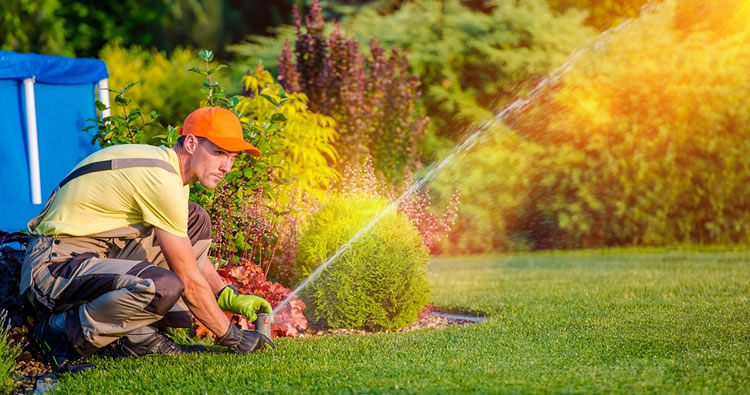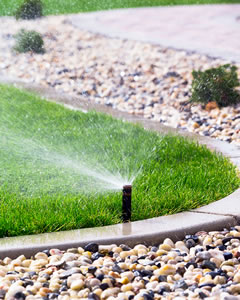
Spring is now quickly approaching and as the temperatures continue to warm and our lawns and gardens begin to show signs of life, there is no better time than right now to make sure your automatic lawn sprinkler system is tuned up and ready for another season of keeping your lawn and garden efficiently watered.
If your irrigation system is being professionally maintained then it’s quite likely you had the system shut down for winter and purged all of the lines of water. This winter was cold enough to freeze underground irrigation pipes and if they were full of water and not blown out, you might have damaged lines that will need to be repaired.
A spring start-up of your irrigation and lawn sprinkler system will discover any problems that might have developed over the winter and get your system into good working order. We can turn on the main water source and get the sprinkler system charged with water. At the same time we can perform any seasonal adjustments, like adjusting the sprinkler head heights and spray patterns to allow for plant growth in your gardens or other significant changes to the landscape.
Here Are a Few Spring Tips For Bringing Your Irrigation and Lawn Sprinkler Systems Back Online After Winter
 #1. Don’t Turn On Your System If The Ground Is Still Frozen
#1. Don’t Turn On Your System If The Ground Is Still Frozen
The soil beneath your landscaping is always the last to thaw and a few cold nights where the temperature drops below 0 is all it takes to cause damage to irrigation pipes that have been filled with water and brought back online too early. While the signs might point to spring, don’t be too eager to rush into starting your system sooner than necessary. You can use a spade shovel or a pickaxe to ensure that your soil is frost-free to at least a depth of 12 inches. If you find the soil is still quite solid and not very easy to dig it’s probably a good idea to wait a little longer.
#2. Inspect The Irrigation Controls and Settings
Run a check of the irrigation controls and programs. This includes dusting away the cobwebs on the timer, making sure the date and time is correct, and that the settings are appropriate for your landscape’s watering needs. Replace the back-up battery in the timer/controller every 6 months, and keep a copy of the watering schedule nearby.
#3. Remove Any Obstructions That Would Block Water or Sprinkler Heads
It’s good practice to a visual inspection of the sprinkler heads to ensure there are no obstructions. A misplaced rock, a pile of dirt or mulch, a shrub or bush that grew more than expected are all items that can obstruct a sprinkler head and the flow of water. A properly tuned lawn sprinkler system relies on the even distribution of water so it’s critical to make sure there are no obstructions.
#4. Replace Damaged or Broken Sprinkler Heads
Sprinkler heads are not always easy to see when nestled snuggly into a healthy lawn or landscape and for this reason they can be damaged quite easily. It could be someone steps (trips) over one, runs over it with a lawn mower or a wheelbarrow. Sprinkler heads just weren’t designed to take this type of abuse. It’s important that a spring start-up of your lawn sprinkler system include a thorough inspection of the sprinkler heads, nozzles and valves.
The point of an automatic sprinkler system is that it’s efficient and saves time and water. If you have broken sprinkler heads or damaged nozzles your system won’t be operating efficiently and will be wasting water and not watering your lawn or garden as it should.
#5. Inspect Valves For Proper Operation
The valves in your irrigation system regulate the flow of water throughout the entire underground sprinkler system. If a valve is leaking your irrigation system will be wasting water, which is going to increase your water bill. It’s important to visually inspect each valve to make sure they are operating properly. A well designed irrigation system will have easily accessible main valves for this very purpose. If you have an older system or have moved into a new-to-you home with existing irrigation and you don’t know where the valves are it’s a good idea to call in a professional to take a look.
If you discover very wet areas on your lawn or areas where the water is pooling up then a leaky valve is always a good first suspect and that is something any good irrigation contractor would be able to repair.
#6. Have The Water Pressure Checked
Lawn sprinkler systems have a safe operating pressure and if that is exceeded the result could be cracked pipes, broken valves and leaks throughout the system. A simple water pressure gauge can be used to determine what the water pressure is from your home and whether it needs to be regulated or not.
Island Pro Mowing and Landscaping Specializes in Spring Start-Ups of Irrigation and Lawn Sprinkler Systems
 When you choose Island Pro Mowing and Landscaping to start up your irrigation or lawn sprinkler system you’re partnering with a small local company that understands irrigation systems and how to set everything up correctly for maximum efficiency. You’ll have the peace of mind knowing your irrigation system has been inspected and worked on by certified irrigation technicians.
When you choose Island Pro Mowing and Landscaping to start up your irrigation or lawn sprinkler system you’re partnering with a small local company that understands irrigation systems and how to set everything up correctly for maximum efficiency. You’ll have the peace of mind knowing your irrigation system has been inspected and worked on by certified irrigation technicians.
If you’d like to receive an estimate from Island Pro to provide irrigation or sprinkler system startup, tune-ups or maintenance for your lawn or garden please give us a call (250) 812-4676 or fill out our contact form and our irrigation specialist can get right back to you.



Connect With Us!